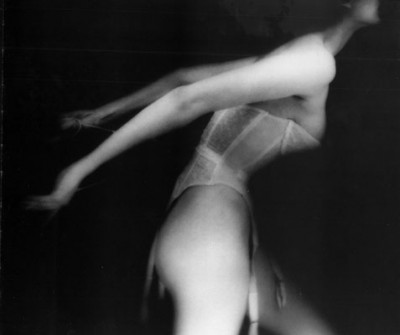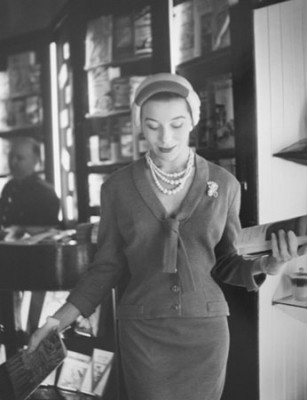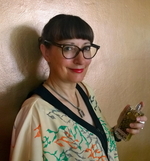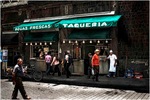Interview with Roja Dove - Part Three: On Chypres & Orientals, the Perfume Industry & Media {Passion for Perfume - Portrait}

Today, Professeur de Parfums and international perfume expert Roja Dove shares his thoughts on the revival of chypres and also the special brand of seduction conveyed by chypres versus oriental fragrances. He then reflects on the state of the perfume industry and the role of the new media and traditional media on the promotion of fragrance culture and education.
If you missed the two first installments, you can also read Part One and Part Two of this interview.
Roja Dove: But I think that….I have this whole story on the chypres. I think that oriental perfumes are all about seduction. They are about just that right amount of décolleté showing, the height of the heel, the shade of the lipstick, all of those things. But I think they’re all about tease, about teasing and they’re about promise. Whereas I think that the chyprés are actually the ones that deliver.........

I think they are the most sensual and/or sexual of the perfume accords. And I think that because I am English and I am very proud that I am, and I am very proud that I work in an industry which has been dominated by the French for a very long time. I have also this very stupid idea, very silly idea of black and white films from the 1950s where you see women wearing these impeccable suits where the skirt is always very, very tight to the knee and often she is portrayed because society was that way as the very efficient secretary or something in the office, and as she leaves the man’s room the camera always pans down to her backside and if you think, you know, that this dress, skirt rather, which is very tight and under it there is a stocking top and a suspender belt and a suspender and her underwear and you don’t see a mark. And so I like this idea because the chypres are so tailored. The chypres are about tailoring and understatement and structure like a very fine couture suit. So the reason it was called Unspoken is that it was about a fragrance that was all about discipline and containment, which is what the chypres are about. However, underneath who knows what is laying there. It’s everything you imagine and you hope. But you wouldn’t dare ask. This is why it is Unspoken.
MHW: Yes, I understand, [laughters] I mean I understand. I mean I am not going to say exactly what I think but I do think that the chypres have a sophistication sometimes that orientals don’t have to them. They are more complicated in a way than orientals and they also put a distance, a social distance, with mmm, you know, potential suitors let’s say. Yet they have this sillage that is sometimes extraordinary and like a rope.
RD: [Laughters] That’s right, exactly. And I think it’s exactly that. I think it is about – the contrast between a woman wearing a very, very, very beautiful plain Valentino dress or somebody walking out wearing just a garter. One is all about look at me and one is about having the confidence to be happy in your own skin. I think that the chypres are about absolutely no compromise. It is the woman who had preferred to wait for that one piece of maroquinerie (?) and jewelry also rather than having some flashy things that everybody has to look at and they do. I think it’s interesting there started to be a revival of the chypres. I am very, very pleased with it.
MHW: Oh yes, there is definitely one, absolutely.
RD: I have been predicting it for the last three years. I said the next big trend is going to be in the chypre accord. And it is lovely to see that it is happening. And then with Enslaved again what I didn’t want to have was the classical, classical Oriental accord with this huge overdose of vanilla and coumarin and everything else is a cliché. And so I think there are very, very few good orientals I quickly will say.
MHW: Which ones are the good ones?
RD: Well, well that’s of course subjective. But in my opinion I would say you have to put Shalimar there, you have to put Vol de Nuit, you have to put Opium, maybe Must de Cartier, maybe not. And I really think there are very, very few of them. I think that a lot of them fall into this cliché of overdose of vanilla. And so when people work on new orientals they fall always into that trap. In my opinion it is a trap. But I think cliché is a trap. So with this fragrance it sort of weaves through different things. It starts with this…. it has a very big hesperidic note and then has a large floral facet with a little nod toward the L’Origan style accord, a carnation note sitting in there, while actually not touching Coty’s L’Origan nor Opium which is of course inspired by that accord. Then you have a little bit of oakmoss in there which is quite unusual in an oriental and then I put in cedar wood rather than the classical sandalwood, together with vetiver. So you have something, which makes it not as cloying as often the oriental accords can be. Before then it opens into this big oriental base. So the idea of Enslaved was that you have to wait, you have to go through, you have to discover the thing which eventually either enslave you or the person that’s….I don’t know if that makes sense.
MHW: Very promising…. [laughters]
RD: That was the idea. I mean Enslaved I think is an incredibly complex composition.
MHW: Oh, that’s interesting...
RD: And it has a lot of paradoxical and slightly incongruous ingredients or that can generally be considered incongruous. You know there is a little geranium note in the top. So geranium normally you are going to find more in a fougère.
MHW: Yes
RD: And so it’s like that. And eventually it reveals its ultra soft very, very warm, very sensual base and I hope that when that comes, that’s the thing that will attach people, enslave them.
MHW: Oh yes, the base should do that. [laughters] It’s the last word.
RD: Exactly.
MHW: And so I thought, I mean this is maybe a little bit didactic but you made this rather strong comment to Cosmetic News, that “five great vultures have killed the industry….”
RD: Yes
MHW:…..and I thought it would be interesting to hear you elaborate a bit on that position.
RD: When I was young, when I started working in this industry….. but before I started working for this industry you could go from one perfumery to another and you would have a different offering. Today you can go from one country to another and get the same offering, you can go from one continent to another and get the same offering. So I think “globalization”, to quote a horrible piece of parlance, that globalization touches nearly everything. It certainly has touched our industry. And I think that where once in the industry the perfumers really had a voice, today I think the marketers have had a voice.
I think they have had it for too long. And I think they are starting to see the backlash of it. I think that the industry is sort of reinventing itself. I think it’s interesting to see Chanel with the six new fragrances of Jacques Polge for the boutique. I think it’s interesting to see Jean-Claude Ellena having now gone into Hermès. But Hermès are rediscovering their own patrimony. Plus you have the whole Hermessence story, which I know started before him. But you have the Armani Collection Privée. You have Tom Ford with the twelve fragrances. I think we are starting to see non-mainstream fragrances breaking into perfumery again albeit in a small way. You have of course the companies, houses, like Serge Lutens with all the fragrances of Chris Sheldrake and [….] that have been there for quite a while. Annick Goutal who seem to have sort of got a little bit stuck in a rut -- I think they need to reinvent themselves. You have those sort of houses that have stuck there for quite a long time. But this new wave coming in where the first thing is not the price point, they are not looking at should we launch it in a 30 ml […] with a free something. You know there’s a sort of marketing stereotype. So I think that, I do think it is an enormous shame as these monster corporations buy things up, often buying a brand not because they particularly want that brand but because of what comes with it.
MHW: This is paradoxical when you say that marketers are more in the forefront and perfumers have become more like secondary personalities. At the same time however, in the culture, I mean, in our perception of perfumers and perfumery, the perfumers have come to the fore more thanks to the media. So how do you explain this paradox, if there is one?
RD: Well I just think that information generally has come to the fore more just because of what you are doing. Who had the web when Roudnitska was working? Or when Germaine Cellier was working. So I think it’s only because people can access information that many people know of perfumers’ names today. But I think that you are talking about something, if I might say, in my opinion, very specific. That people who hit your website are people with a very specific interest. If you speak to most people walking down the street, they haven’t heard of the perfumers at all.
HMW: Yes, absolutely, yes….I am trying to think of ……..
RD: I think it’s a rarefied audience, in a way, and I agree with you that at least that rarefied audience now can find out who the perfumers actually were. If there was such a rarefied audience 40 years ago, it would have been much more difficult maybe for them to find out who the perfumers actually were. I don’t know, I would imagine.
MHW: Yes. Mmm, I mean this is a historic question and this is probably not really the place to address it, but it’s true that the perfumers have come to the fore more in the past few decades and it started before there were blogs for example. So, you know it’s interesting…..
RD: What perfumers do you have in your mind when you say that?
MHW: Ah, I remember right now an interview with Olivier Cresp in which he said himself that – I can’t remember now in which decade this started – but that journalists started interviewing perfumers and that, that was new.
RD: In the late 1970s, early 1980s....
MHW: Yes, something like that….
RD: I think that came about because you had Robert Guerlain who worked in France on something which came to be called the Jasmine Awards, which you must have heard about?
MHW: Yes, I have
RD: And he thought that the articles written on perfumery were totally banal. And he thought that as the industry spent such fortunes courting the magazines, that the magazines owed it to their readers as well as their advertisers to improve the quality of the articles that were written…..
MHW: I see…
RD: So I don’t know if that’s the only reason, but I’m sure it would have been one of the big catalysts. But they started that up in France, it was very successful, they then brought it over to Britain, I don’t know which other countries it exists in. But I think where else could they go - the journalists - other than to the creators, so that is where it started. That maybe was one of the catalysts.
MHW: This is a very interesting point and I'm sure it must have been a contributing element.
RD: Yes, one of the catalysts
MHW: There is also your work as a historian of fragrances…..
[To be continued...]
Photos from Michael Hoppen Gallery










I attended Sniffa Fall Ball and in my conversation with Etienne de Swardt I purchased Putain de Palaces. He told me it was his favorite too because of the freedom of expression as his first fragrance, before the marketing team took over his creations.
Really? I'm a bit surprised because it is not his most daring perfume. And I thought also that they did not work with a marketing team in any constraining manner? Should we assume that he was forced by the marketing team to create Sécrétions Magnifiques as they made him realize that he was not enough of an avant-gardist?
The movement in France started also with Comite Francais du Parfum who's aim is to promote fragrance and fragrance culture.
Before 70's it was impossible for me to find any interview of a perfumer, even in professional mag (SPC, PCA, P&F)... the only thing you might find was a ... necrologue. And that was all. You might compare this with the fashion. Before WW2 they were just dressmakers. You didn't write or speak about your dressmaker even if it was Chanel or Lanvin. As fashion changed society started to perceive them as artists/designers, etc and the fashion mag changed. Compare Vogue Paris from the 60's with what's now. It was another world. In perfumery industry the same process started later...so in 10 years it will be completely different. For most brands they are still suppliers even if they name them on press releases! ELLE YSL started something new when they put Firmenich perfumers to explain in the video their creation. Ellena is a rare case! When you will see the perfumer's name on the bottle maybe the world will be different.
Now it's still Private Blend by Tom Ford. :))
interesting question, I wish I could ask him...perhaps the first creation always holds a special place...I am still exploring the line and don't begin to be a critic...I adore powdery fragrances and apparently Etienne does too.
As I seem to have veered off subject somewhat, I apologize. Very much enjoyed the interview, look forward to trying the three new fragrances and thank you for sharing Roja Dove's incomparable viewpoint.